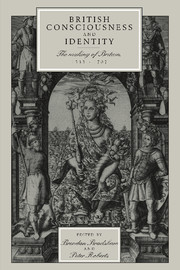Book contents
- Frontmatter
- Contents
- Notes on the contributors
- Preface
- Introduction
- 1 Tudor Wales, national identity and the British inheritance
- 2 The English Reformation and identity formation in Ireland and Wales
- 3 Faith, culture and sovereignty: Irish nationality and its development, 1558–1625
- 4 From English to British literature: John Lyly's Euphues and Edmund Spenser's The Faerie Queen
- 5 The British problem in three tracts on Ireland by Spenser, Bacon and Milton
- 6 James Ussher and the creation of an Irish protestant identity
- 7 Seventeenth-century Wales: definition and identity
- 8 Scottish identity in the seventeenth century
- 9 The Gaidhealtachd and the emergence of the Scottish Highlands
- 10 ‘No remedy more proper’: Anglo-Irish unionism before 1707
- 11 Protestantism, constitutionalism and British identity under the later Stuarts
- Index
1 - Tudor Wales, national identity and the British inheritance
Published online by Cambridge University Press: 15 March 2010
- Frontmatter
- Contents
- Notes on the contributors
- Preface
- Introduction
- 1 Tudor Wales, national identity and the British inheritance
- 2 The English Reformation and identity formation in Ireland and Wales
- 3 Faith, culture and sovereignty: Irish nationality and its development, 1558–1625
- 4 From English to British literature: John Lyly's Euphues and Edmund Spenser's The Faerie Queen
- 5 The British problem in three tracts on Ireland by Spenser, Bacon and Milton
- 6 James Ussher and the creation of an Irish protestant identity
- 7 Seventeenth-century Wales: definition and identity
- 8 Scottish identity in the seventeenth century
- 9 The Gaidhealtachd and the emergence of the Scottish Highlands
- 10 ‘No remedy more proper’: Anglo-Irish unionism before 1707
- 11 Protestantism, constitutionalism and British identity under the later Stuarts
- Index
Summary
The concept of Britain which dominated the history of Wales in the Tudor period was the long-held belief that the Welsh were the descendants of the ancient Britons and that they spoke ‘the British tongue’. The consciousness of this inheritance, heightened by the perception that the dynasty was of Welsh name and descent, was to have a transformative impact on the sense of a national identity which survived the constitutional union with England. Indeed Wales and Welsh identity emerged from the imperial programme of the Tudors strengthened rather than undermined. The explanation of this paradox is central to the agenda for the new British history in its Welsh dimension. It has long been evident from the anglocentric character of the traditional accounts of early modern England that the most persistent ‘British Problem’ is one of historiography. The call to revision invites a discussion of the extent to which the old British History – including the Historia Regum Britanniae of Geoffrey of Monmouth, as it was manipulated by Welsh historians and other writers in the post-union period – shaped not only dynastic propaganda but national identity and British consciousness. Some of these commentators even aspired to exercise a formative influence on Tudor and early Stuart policy or statecraft.
The so-called Act of Union of 1536 (27 Henry VIII, c. 26), formed part of Cromwell's legislative programme for the integration of the realm. The dissolution of the marcher lordships in this act was complemented by the abolition of liberties and franchises within the realm in a contemporaneous act (27 Henry VIII, c. 24).
- Type
- Chapter
- Information
- British Consciousness and IdentityThe Making of Britain, 1533–1707, pp. 8 - 42Publisher: Cambridge University PressPrint publication year: 1998
- 9
- Cited by

